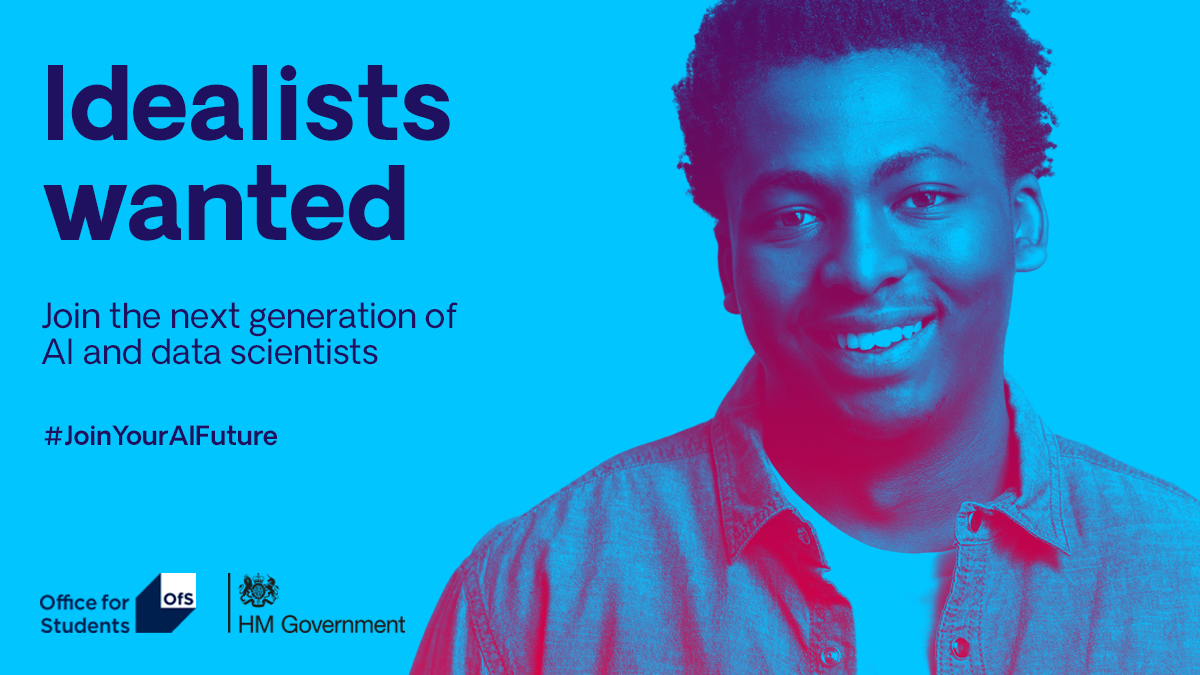The Office for Students (OfS) has today launched a campaign to fill 2,500 new places on postgraduate artificial intelligence and data science conversion courses.

The programme of courses, which begin from autumn 2020, will be available in 28 universities across England, with 1,000 scholarships available to students from underrepresented backgrounds.
Through specialist teaching and paid work placements, the conversion courses will allow graduates from both STEM (science, technology, engineering and mathematics) and non or far STEM subjects, like philosophy or geography, to significantly boost their digital skills – helping to address the shortage of AI and data specialists joining the UK workforce.
The programme aims to target graduates from backgrounds often underrepresented in these industries, particularly female, disabled and black students – £10 million will be used for scholarships to support students from underrepresented groups, out of a total of up to £24 million invested by government, universities and industry partners.
The data science and AI courses developed by these universities will teach skills relevant to a wide range of industries: many of which will be crucial to support recovery following the coronavirus pandemic including medicine, transport, social sciences, and biosciences. AI is being used in innovative ways in many other fields too, for example in countering online abuse, detecting early signs of disease, and driving improved support for at-risk communities such as refugees.
Applicants could include people returning to work after a career break and looking to retrain in a new profession.
Chris Millward, Director for Fair Access and Participation at the Office for Students, said:
'In recent years we have seen significant and increasing demand for digital skills in a range of fields. From healthcare and biosciences, to industry and transport – harnessing artificial intelligence and data science will be crucial in tackling significant global challenges for years to come.
'It is also critical that graduates from all backgrounds have equal opportunities to gain the skills that employers need. With new AI and data science conversion courses across the country, and scholarships available to students from underrepresented backgrounds, this programme will both help tackle skills gaps and increase choice and opportunities for all students.'
For more information see the announcement on GOV.UK.
The Office for Students has also today published new webpages with information for prospective students.
For further details please contact [email protected].
Notes
- The government’s Digital Strategy predicts that, within 20 years, 90 per cent of all jobs will require some element of digital skills. The Industrial Strategy states the UK’s ambition to generate good jobs and greater earning power for all; addressing skills shortages is a key component of the artificial intelligence and data ‘grand challenge’ which aims to remove retraining barriers, normalise career changes and drive diversity. This funding aims to address these issues by working with universities and industry to allow people from non-STEM backgrounds to train in artificial intelligence and data science.
- A conversion course may be aimed at either upskilling someone with capabilities and expertise to enhance those they have already or equipping them with entirely new capabilities and expertise aimed at a career change. The skills and competences offered by such courses are applicable to a wide range of professions: from jobs requiring highly technical data science and engineering knowledge, to broader business and management process roles.
- These courses are the latest stage of the government’s support for strengthening the UK’s artificial intelligence talent pipeline and represent the delivery of another of the key commitments in the £1 billion AI Sector Deal. The AI Sector Deal sets out how artificial intelligence and data will bring economic growth to the UK.
- See further details of the universities which have been awarded funding and are developing postgraduate conversion courses.
- Within the context of the coronavirus (COVID-19) pandemic, the OfS expects all universities to give prospective students clear and timely information about how their course will be taught, so students can confirm their choice of course and university with confidence. Universities must also let prospective and current students know about any planned and possible changes, keep them well informed as circumstances change, and make all reasonable efforts to maintain the quality of teaching on offer. For more information, please see the OfS's guidance to providers.
